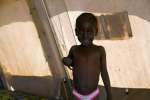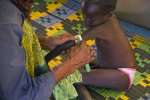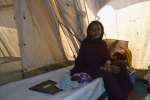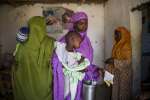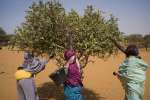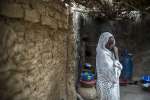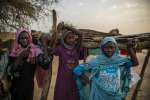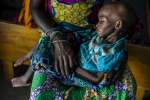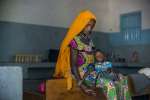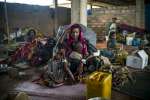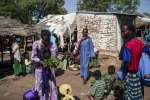Food cuts in Chad camps expose refugee women and children to exploitation, abuse
A funding shortfall has forced the World Food Programme (WFP) to cut food rations in refugee camps in eastern Chad by up to 60 per cent. As a result, Sudanese refugees in 13 camps in the east now receive about 850 calories per day, down from the minimum ration of 2,100 calories daily they used to get. The refugees are finding it difficult to cope. Clinics in the area report a significant spike in malnutrition cases, with rates as high as 19.5 per cent in Am Nabak camp.
WFP needs to raise US$ 186 million to maintain feeding programmes for refugees in Africa through the end of the year. Additionally, UNHCR is urgently seeking contributions towards the US$ 78 million it has budgeted this year for food security and nutrition programmes serving refugees in Africa.
In the meantime, the refugees experiencing ration cuts have few options. Poor soil quality, dry conditions and little access to water mean they can't plant supplemental crops as refugees in the less arid south of Chad are able to do. To try to cope, many refugee women in eastern Chad are leaving the camps in search of work in surrounding towns. They clean houses, do laundry, fetch water and firewood and work as construction labourers. Even so, they earn very little and often depend on each other for support. In the town of Iriba, for example, some 50 refugee women sleep rough each night under a tree and share their some of their meagre earnings to pay for a daily, communal meal.
They are also subject to exploitation. Sometimes, their temporary employers refuse to pay them at the end of the day. And some women and girls have resorted to prostitution to earn money to feed their families.
Ration cuts can have an impact far beyond health, reverberating through the entire community. It is not uncommon for children to be pulled out of school on market days in order to work. Many refugees use a portion of their food rations to barter for other essentials, or to get cash to pay school fees or buy supplies for their children. Small business owners like butchers, hairdressers and tailors - some of them refugees - also feel the pinch.
WFP supplies food to some 240,500 Sudanese refugees in the camps of eastern Chad. Many have been in exile for years and, because of their limited opportunities for self-sufficiency, remain almost totally dependent on outside help. The ration cuts have made an already difficult situation much worse for refugees who were already struggling.





